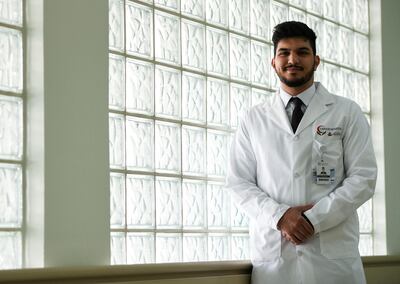A young mother launched a search for two women who saved her life after she choked on her food at a restaurant in Dubai.
Emma – who asked not to be named – had difficulties breathing after a piece of mango became lodged in her throat while she was dining at a restaurant in Sheikh Zayed Road.
Failing to get their names at the time following the shock of the incident, she later launched a hunt on the British Mums Dubai Facebook page for the two women who came to her aid.
"Someone sent me a private message to tell me who they were and I was able to contact them and thank them," Emma told The National.
"At first I thought I could just keep swallowing and tried to drink some water, but the water wouldn't go down and it soon became evident that the mango wasn't moving and I wasn't able to breathe.
"I remember standing up, trying to gasp for any kind of breath and hoping that someone would know what to do. Two ladies saw me and came rushing over, one performed the Heimlich manoeuvre and I think it was after two large pushes that the mango came out."
The women then stayed with her to make sure she was OK, she said.
"I was shaking from the shock, at how quickly I had gone from enjoying a leisurely breakfast and talking to not being able to catch a breath.
"I am so incredibly grateful for these ladies who knew what to do and I would urge everyone to learn basic first aid. It could save a life. I'm going to sign up to do a first aid course."
According to a recent study by the University of Sharjah, more than half of the UAE’s population does not know basic first aid.
The report, published this year, surveyed more than 500 people over the age of 30 in 2017.
Researchers found one in three were not willing to help in a life-threatening situation. However, the study also found the majority of respondents – eight out of 10 – were interested in taking a first aid course.
It revealed many said they were held back from doing so because of the lack of availability of affordable programmes. It suggested people would be willing to help strangers needing assistance if they were trained how to respond safely.
"One of the most fascinating findings was that people were willing to do CPR, a procedure carried out when someone is having a cardiac arrest, but they were afraid to do so," said Dr Omar Midani, a former medical graduate at the University of Sharjah who worked on the study.
A new "good Samaritan" law approved by the UAE Ministry of Health last month now allows members of the public to assist in emergencies without fear of legal ramifications.
Previously, many residents have been reticent to intervene in a medical emergency due to the potential threat of legal complications.

Emma's appeal, posted on the British Mums Dubai Facebook page, came on the same day a tourist launched a similar campaign to find a man who saved him from choking to death in Dubai on Monday.
The tourist, called Peter, launched an appeal on social media to thank the bystander after he began choking at a shopping centre in Jumeirah.
Speaking to ARN news, the tourist, who is in the UAE visiting his son, said he wanted to thank a man called John who performed the Heimlich manoeuvre on him.
“It was getting worse as I was sitting there. I slowly got up and my wife and I walked across, trying to breathe, to the community pharmacy,” he said.
“There, I sat down and a big guy came up – John, as I found out afterwards, tried to do the Heimlich manoeuvre on my chest. That was the last [thing] I remember.”
The tourist is searching for the man as he would like to thank him properly, he said.
Rebecca Smith, a registered nurse who works with Safe Hands, a first aid training company, said as long as you get the positioning correct and you use the right amount of force, the Heimlich manoeuvre is “extremely effective”.
She said to perform the manoeuvre, you should be positioned behind the choking person, which may require you to kneel if it is a child. If it is an adult, stand behind them.
“What you then want to do with your leading hand, which is usually the hand you write with, is reach around and try to locate the person’s navel or belly button with one finger,” said Ms Smith.
“Then create a fist with the other hand and place the thumb side of the other fist towards the abdomen, just above the navel. You then grab that fist with your initial hand and pull back using an inward and upward motion.”
That motion places a sharp upward pressure on the diaphragm, which is located just under the lungs, that will theoretically expel the object the object out of the airway.
She said she would always recommend people were trained in the technique first.

